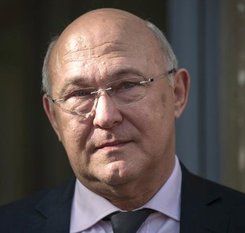Finance Minister Michael Sapin said in a press conference that France’s growth outlook has been lowered to just 0.4% for 2014, from the 0.5% announced just a few weeks ago. He added that his country will exceed the European Union’s public deficit limit again.
The forecast for 2015 GDP growth has been lowered from 1.7% to 1%.
Rather than declining to 3.8%, Mr. Sapin said the French public deficit will increase to 4.4% of GDP. This is the first annual increase in the deficit since 2010.
Mr. Sapin said a series of public expenditure cuts will reduce the public deficit to 4.3% in 2015, and then to less than 3% in 2017.
Government revenue not increasing
Initially, President François Hollande’s government had committed to a 3% public deficit target by 2015. However, a lackluster economy has not brought in the government revenues he had expected.
In 2013, the Socialist government gained a 2-year extension from the European Commission to bring its deficit to within the agreed limit.
Blaming the disappointing news on a combination of poor economic growth and ultra-low inflation, Mr. Sapin urged the European Union to “collectively take into account (an economic situation) unprecedented in recent European history.” He stressed that poor growth is a Eurozone problem, and not just a French one.
Will new Brussels team budge?
Mr. Sapin’s defiant statement comes just before the European Union unveils its new European Commission, which has been urging France to adhere to an already extended timetable.
Mr. Sapin’s Socialist predecessor, Pierre Moscovici joined the EU executive team as the European Commissioner for Economic and Monetary Affairs today.
Mr. Moscovici, a believer in Keynsian demand-led economics, will work under two strict fiscal disciplinarians, Jyrki Katainen (former Prime Minister of Finland) and Valdis Dombrovskis (former Prime Minister of Latvia).

Whether this new mix of roles might help France’s chances of not facing disciplinary action by Brussels for missing its deficit target again, remains to be seen.
Earlier this year, the European Commission and the German government slapped down tentative signals from France that more time would be required for it to meet its budget deficit target. Both believe France has been too slow to implement structural reforms.
President Hollande’s popularity nosedived this year as his country experienced zero GDP growth in the first six months of 2014 and rising unemployment. Voters see the much-promised economic rebound as nothing but empty words.
While making it clear he was not asking for the Eurozone’s fiscal rules to be altered, Mr. Sapin emphasized his country needs room to grow while his government attempts to reduce the deficit.
Raising taxes not an option
Under Presidents Sarkozy and Hollande, taxes in France have risen by over €60 billion ($78 billion) in 36 months. Taxation makes up approximately 46% of GDP.
Mr. Sapin says increasing taxes is not an option, there is simply no more room. “That period is over. Our objective is now tax stability to give visibility to allow for investment.”
The French government will have to reduce the deficit by spending less – it is planning on a total reduction of €50 billion by 2017. Mr. Sapin said that any savings lost due to ultra-low inflation will have to be made up elsewhere.
